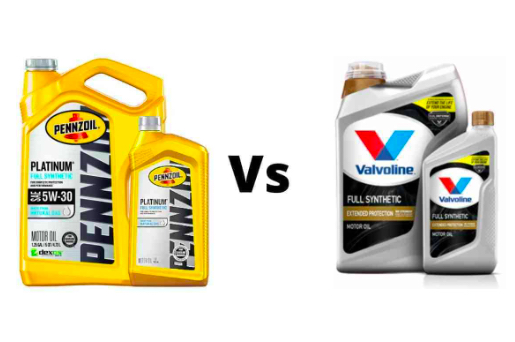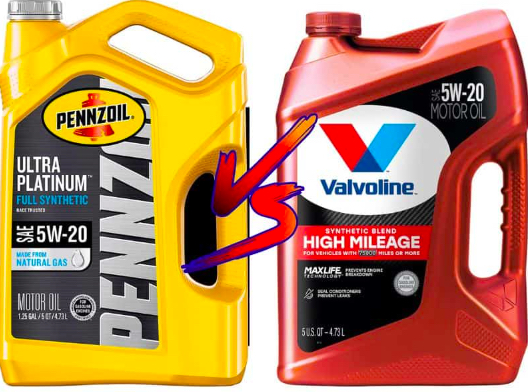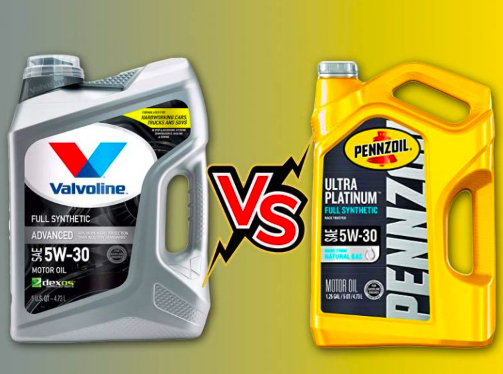The task can pose a challenge in selecting motor oil for one’s vehicle. The vast and intricate landscape of the automotive oil industry presents consumers with many options. Synthetic and conventional oils are the two primary contenders, each with unique merits.
Synthetic oil, often the preferred choice, distinguishes itself with its reduced impurities compared to regular oil and its remarkable resistance to elevated temperatures. One might wonder about the differentiation between Pennzoil vs. Valvoline motor oils: How profound is it? The answer, rooted in using the same base oil for both synthetic oils, reveals that the variance is less extensive than one might initially surmise. Diverse factors, encompassing variety, engine compatibility, and engine cleanliness, contribute to the discernible distinctions.
Within the confines of this article, a comprehensive comparison of Pennzoil versus Valvoline synthetic oils will transpire, assisting you in your quest to determine the superior choice. Delving into the advantages and drawbacks of each oil shall pave the way for a more informed decision.
Analyzing the Distinctions: Pennzoil Vs. Valvoline

The motor oil industry, catering to various automobiles and engines, is a fiercely competitive domain. Herein, a brief comparison between Pennzoil and Valvoline synthetic oils unfolds.
Pennzoil:
- Composition: 100% synthetic base
- Weight: 11.9 Pounds
- Oil change interval: 5,000 to 7,000 miles
- Engine Type: Gasoline
- Performance: Enhanced wear protection in all weather conditions
- Unique Feature: Prevents sludge and deposits from accumulating
- Fuel Economy Improvement: Yes
- Extended Drain Interval: Formulated for exceptional oil breakdown resistance
Valvoline:
- Composition: Synthetic blend
- Weight: 29.9 Pounds
- Oil change interval: 3,000 to 4,000 miles
- Engine Type: Gasoline/Diesel/Petrol
- Performance: 40% greater wear prevention than standard motor oils
- Unique Feature: Protects against heat exceptionally well
- Deposit Protection: Offers 25% more protection against deposits
- Fuel Economy Improvement: Complies with the API SP standard
- Extended Drain Interval: Superior protection against oil breakdown under extreme conditions
A Detailed Examination of Pennzoil Vs. Valvoline
Synthetic motor oils, derived from synthetic materials, inherently exhibit heightened durability and greater thermal deterioration resistance than conventional oils.
With a history of almost 150 years, Valvoline continues to innovate in the industry. Valvoline’s hallmark is a wide selection of engine oils tailored to suit various vehicles.
While most engine oils derive from crude oil, Pennzoil’s synthetic oil utilizes natural gas as its foundational base. The patented liquid-to-gas process employed by Pennzoil ensures that their synthetic oils boast remarkable clarity and are nearly 99.5% free of impurities.
Pennzoil Features:
- First natural gas-based synthetic engine oil
- Formulated for recent model SUVs, small vans, light trucks, and cars with over 75,000 miles
- The high mileage formula reduces leaks and oil consumption in older engines
- Demonstrates superior performance under extreme temperature conditions
Valvoline Features:
- Offers excellent protection against engine wear and corrosion across vehicle types
- Valvoline Durablend Motor Oil, a best-seller, guards against wear, sludge, and oil breakdown
- Ideal for high mileage applications, preventing engine wear from extreme heat and friction
- Tailored to perform in both hot and cold conditions
Oil Change Frequency Comparison
Valvoline oil necessitates an oil change every 3,000 to 4,000 miles, owing to its lower Total Base Number (TBN), indicating more frequent changes. In contrast, Pennzoil oil typically requires replacement between 5,000 to 7,500 miles. This heightened efficiency and extended lifespan result from Pennzoil’s unique gas-to-liquid manufacturing process, which minimizes the need for frequent oil changes and augments fuel economy.
Pros and Cons of Pennzoil
Pros:
- Consistently delivers high performance in diverse climates
- Effectively lubricates and safeguards the engine from wear
- Enhances engine efficiency
- Promotes improved oil flow for quicker cold starts
- Prolongs piston life
- Allows for oil recycling and reuse
Cons:
- Caps require careful handling
- It may not be suitable for all vehicle types
Pros and Cons of Valvoline:
Pros:
- Prevents the accumulation of sludge and lacquer
- Effective in both cold and hot weather conditions
- Compatible with turbochargers
- Suitable for use with conventional and synthetic lubricants
- Enhances fuel efficiency
Cons:
- Shorter intervals between oil changes
- The quality of the casing may be subpar
Pennzoil Vs. Valvoline: The Price of Oil

The cost of motor oil varies depending on type and container size. Generally, engine oil prices range from $4 to $10 per liter. Synthetic oil tends to be pricier than conventional oil. For instance, a 5-quart container of Valvoline advanced fully synthetic SAE 5W-30 engine oil is priced at $22.47, while Pennzoil Platinum fully synthetic 5W-30 engine oil costs $22.93.
In the realm of oil changes, both Valvoline and Pennzoil advocate intervals of 3,000 to 5,000 miles to maintain optimal engine performance. For conventional oil, a 5-quart container of Valvoline Extra Protection SAE 10W-40 traditional engine oil costs $35.41, while Pennzoil conventional 10W-30 engine oil is priced at $18.98.
Pennzoil Vs. Valvoline: The Ultimate Choice
Pennzoil and Valvoline oils share commendable qualities, leaving one to ponder: which oil claims the upper hand in the Pennzoil versus Valvoline rivalry? While both oils reduce engine wear, Pennzoil boasts higher mileage per gallon (MPG), making it a cost-efficient choice for those who frequently traverse interstates.
However, Valvoline outshines Pennzoil in terms of safeguarding engines against sludge buildup. Valvoline may be preferable for individuals residing in colder climates or predominantly traversing highways and high-speed routes.
The ultimate decision between these two synthetic oils hinges largely on individual driving habits and geographical location. Fortunately, both Pennzoil and Valvoline offer distinct advantages, allowing consumers to tailor their choices to their unique needs.
In Closing
Pennzoil vs. Valvoline: Which path should you tread? Which one bestows superior value upon you? The differentiating factor primarily resides in Valvoline’s ability to thwart sludge buildup compared to Pennzoil. Thus, Valvoline may be the selection if you are in a chilly climate or engaging in substantial highway driving. Conversely, if reduced fuel consumption equals diminished costs, Pennzoil might emerge as the more prudent choice.
Ultimately, selecting the right oil remains paramount, aligning with your requirements. While our guidance may serve as a compass, the final decision rests firmly in your hands.
